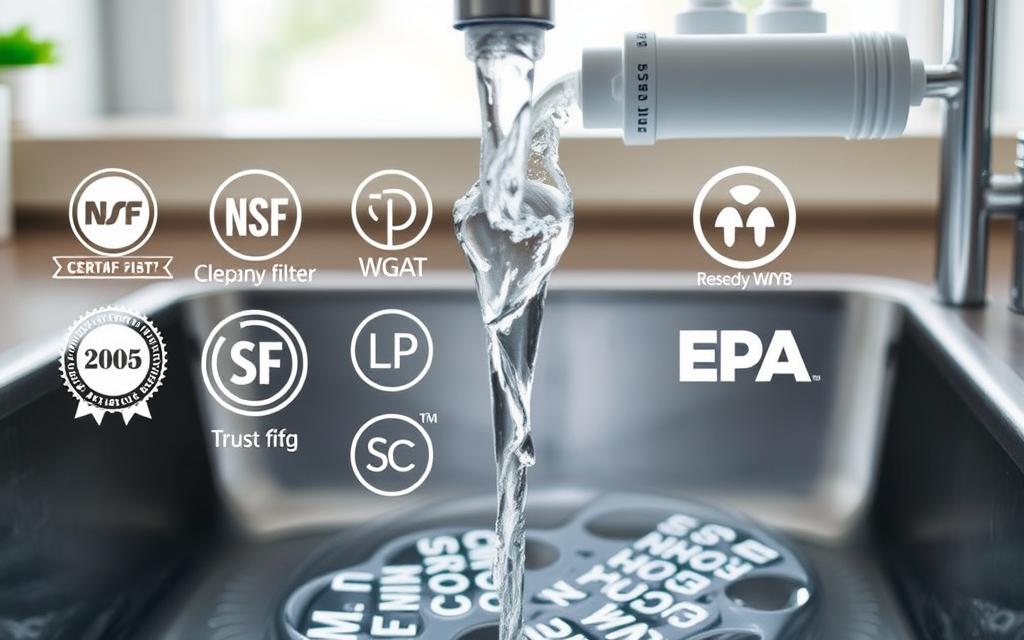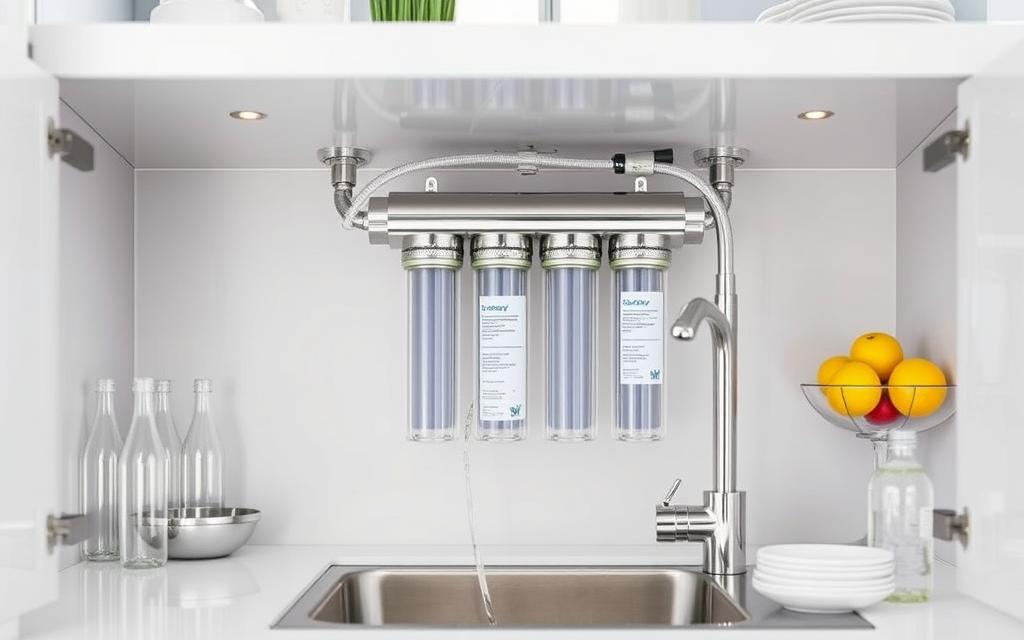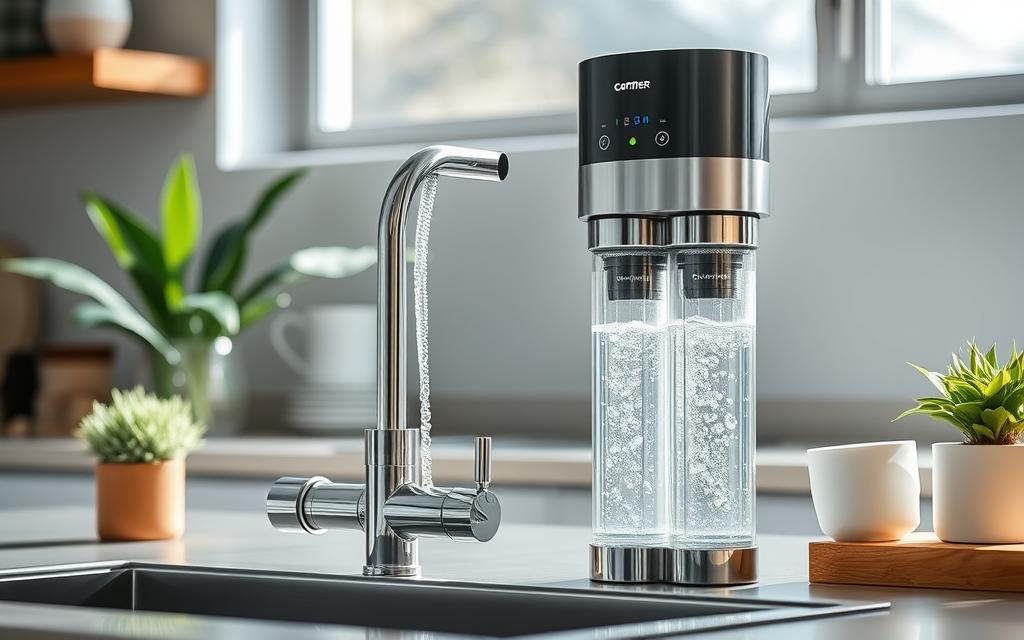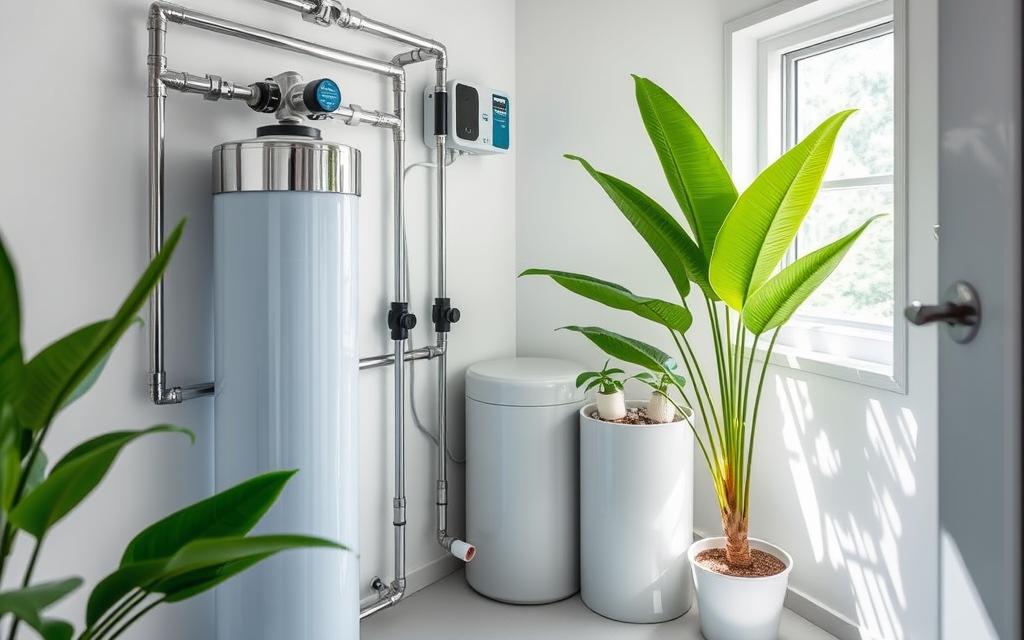I’ve always cared about the water I drink. Bottled water has become very popular, but I wonder if it’s the best choice. I’m looking into under sink water filters as a possible alternative. They might be better for the environment and save money.
Key Takeaways
- Understand the basics of water filtration and the different types of technologies available.
- Explore the environmental impact and hidden costs associated with bottled water.
- Discover the health benefits of drinking filtered tap water over bottled water.
- Learn about the installation and maintenance requirements of under sink water filters.
- Uncover the truth behind common myths surrounding bottled water quality and regulation.
Understanding Water Filtration Basics
Having clean, safe drinking water is key for many families. Water filters help remove harmful substances like chlorine and lead. This makes water healthier and more enjoyable to drink. Knowing how water filters work helps you choose the right one for your home.
How Water Filters Remove Contaminants
Water filters use different technologies to clean your water. Activated carbon filters are great at removing chlorine and pesticides. Reverse osmosis systems get rid of dissolved minerals and heavy metals.
Ultraviolet (UV) purification systems kill harmful bacteria and viruses. This ensures your water is safe to drink.
Different Types of Filtration Technologies
- Activated carbon filters
- Reverse osmosis systems
- Ultraviolet (UV) purification
- Ion exchange resins
- Sediment filters
Common Water Quality Issues
Tap water can have many contaminants, including chlorine, lead, microorganisms, and heavy metals. These can change the taste and smell of your water. They can also be harmful to your health.
By knowing what each filtration method can do, you can pick the best one. This helps remove water impurities from your home.
“Protecting the purity of our water supply is not just a matter of convenience – it’s a fundamental issue of public health and environmental responsibility.”
The Environmental Impact of Bottled Water
The bottled water industry is seen as a healthy and easy choice. But, its environmental impact is often ignored. As someone who cares about the planet, I think it’s important to talk about the hidden costs of bottled water.
One big problem is plastic pollution. Millions of plastic bottles are thrown away every year. They end up in landfills, oceans, and other places, harming wildlife and ecosystems.
Another issue is the carbon footprint from making and moving bottled water. The energy needed for this process leads to a lot of greenhouse gas emissions. This makes it hard to be sustainable and fight climate change.
Using filtered tap water is a better choice. It cuts down on plastic waste and lowers our carbon footprint. Tap water is also cheaper to treat and transport than bottled water.
Choosing under-sink water filters is a smart move for the environment. It helps us reduce plastic waste and carbon emissions. This way, we can help make the world a better place for the future.
| Environmental Impact | Bottled Water | Filtered Tap Water |
|---|---|---|
| Plastic Waste | High | Low |
| Carbon Footprint | High | Low |
| Sustainability | Low | High |
Cost Comparison: Under Sink Filters vs Bottled Water
Choosing between under sink water filters and bottled water affects your budget. Let’s explore the costs of each option. We’ll look at the upfront and long-term expenses, including hidden costs.
Initial Installation Expenses
Under sink water filters cost between $50 to $500 for the unit and installation. This initial investment can save you money in the long run. It eliminates the need for constant bottled water purchases.
Long-term Financial Benefits
Bottled water might seem convenient, but it’s expensive. Households spend $300 to $1,500 yearly on it. Using an under sink filter can save you money over time.
Hidden Costs of Both Options
Both options have hidden costs. Filters need replacement cartridges, costing $20 to $100 yearly. Bottled water generates waste and requires energy for transportation and packaging. These factors increase your expenses and environmental impact.
| Cost Factor | Under Sink Water Filter | Bottled Water |
|---|---|---|
| Initial Setup | $50 – $500 | $0 |
| Annual Expenses | $20 – $100 (filter replacement) | $300 – $1,500 (average household) |
| Hidden Costs | Minimal waste | Transportation, packaging, environmental impact |
| Long-term Savings | Significant | Limited |
An under sink water filter is more cost-effective and eco-friendly. It offers significant long-term savings and minimal waste.
Are Under Sink Water Filters Better Than Bottled Water?
The debate between under sink water filters and bottled water has been ongoing. As a careful consumer, I’ve looked into both options. I wanted to make a well-informed choice.
Under sink water filters offer a big advantage: they improve water quality. They remove contaminants like chlorine, lead, and bacteria. This makes the water fresher and healthier. On the other hand, the quality of bottled water can be inconsistent. Some brands may have impurities.
| Feature | Under Sink Water Filters | Bottled Water |
|---|---|---|
| Water Quality | Consistently high, with advanced filtration | Varying quality, some with impurities |
| Environmental Impact | Reduced plastic waste, more sustainable | Significant plastic waste, resource-intensive |
| Cost-Effectiveness | Lower long-term costs, higher initial investment | Higher ongoing costs, more convenient |
Under sink water filters also have a big environmental benefit. They cut down on plastic waste and save resources. This fits well with my goal of living sustainably.
While they cost more upfront, under sink filters save money in the long run. They are cheaper than buying bottled water over time. This makes them a smart choice financially.
In conclusion, after considering the pros and cons, I think under sink water filters are better. They offer better water quality, are better for the environment, and save money. They are a practical and sustainable choice for my home.
Health Benefits of Filtered Tap Water
Filtered tap water has many health benefits that can greatly improve our well-being. It goes through a water purification process. This removes harmful contaminants, making it safer and healthier to drink.
Filtered tap water removes dangerous substances like heavy metals, bacteria, and organic compounds. This contaminant removal protects our bodies from harm. It reduces the risk of illnesses and promotes drinking water safety.
The filtration process also keeps natural minerals in tap water. These minerals, like calcium and magnesium, are important for our health. They help with bone health, blood pressure, and muscle and nerve function.
“Drinking clean, filtered water is one of the easiest and most effective ways to improve your overall health and well-being.”
Filtered tap water is safer than bottled water, which can have microplastics or contaminants. Drinking filtered tap water means you’re getting a high-quality, contaminant-free drink. It supports your health and hydration needs.
| Health Benefit | Filtered Tap Water | Bottled Water |
|---|---|---|
| Contaminant Removal | Effective at removing harmful substances | Lack of consistent regulation and testing |
| Mineral Preservation | Retains essential minerals | May lack natural minerals |
| Hydration Support | Provides optimal hydration | Potential for inadequate hydration |
Choosing filtered tap water offers a safer, more sustainable, and cost-effective way to stay hydrated. It supports our overall well-being.
Installation and Maintenance Requirements
Having an under sink water filter system needs some effort, but it’s worth it. From water filter installation to regular filter maintenance, we’ll cover the steps to keep it working well.
DIY Installation Tips
Setting up an under sink water filter is easier than you think. With basic tools and patience, you can do it yourself. Here are some tips to help you:
- Measure your space well to make sure the filter fits under your sink.
- Turn off the water and drain the line before starting.
- Follow the maker’s instructions carefully, as each model is different.
- Use Teflon tape on threaded parts to avoid leaks.
- Test the system after installation to find any problems.
Regular Maintenance Schedule
Keeping your under sink water filter in good shape is key. Set up a regular maintenance plan to keep it working well:
- Change the filter cartridge as the maker suggests, usually every 6 to 12 months.
- Check for leaks or damage and fix them right away.
- Clean the filter housing and parts you can reach to stop buildup.
- Flush the system now and then to get rid of sediment or impurities.
When to Replace Filter Components
Knowing when to swap out your filter cartridge or other parts is important. Look for these signs that it’s time for a new one:
| Component | Replacement Frequency |
|---|---|
| Filter Cartridge | Every 6-12 months, or as indicated by the manufacturer |
| O-rings and Gaskets | Every 1-2 years, or as needed to maintain a proper seal |
| Filter Housing | Every 5-10 years, or if the housing becomes cracked or damaged |
By following these tips, your under sink water filter system will keep giving you clean, fresh water for many years.
Water Quality Testing and Standards
Keeping our drinking water safe and clean is very important. As consumers, we should know about water quality rules and testing methods. The Environmental Protection Agency (EPA) sets strict rules for tap water safety, called the National Primary Drinking Water Regulations.
To check if your tap water is safe, use water testing kits. These kits help find contaminant levels like heavy metals and bacteria. Knowing your local water safety regulations and test results helps you keep your family’s water clean and safe.
| EPA Guideline | Maximum Contaminant Level |
|---|---|
| Lead | 15 parts per billion (ppb) |
| Nitrates | 10 parts per million (ppm) |
| Coliform Bacteria | 0 colonies per 100 mL |
Following EPA guidelines helps keep your drinking water safe and healthy. Regular water quality tests are key to keeping your home’s water supply safe and protecting your family’s health.
“Drinking water that meets all federal and state standards is the best choice for consumers.”
Taste and Freshness Comparison
The debate between filtered tap water and bottled water is quite interesting. The mineral content in water greatly affects its taste. Many people enjoy the crisp, refreshing taste of filtered water.
Mineral Content Effects
The minerals in water can change its taste a lot. Bottled water, which is often processed more, has a consistent mineral profile. This makes its taste more predictable. On the other hand, filtered tap water keeps natural minerals, giving it a more complex taste.
Whether you prefer the taste of filtered tap water or bottled water depends on your taste. Some like the richer taste of tap water.
Storage Impact on Water Quality
How water is stored affects its freshness and taste. Bottled water, stored in plastic, can pick up chemicals from the packaging. This is more likely if the bottles get hot or sit for a long time.
Filtered tap water, stored in clean containers, stays fresh longer. It keeps its taste and quality better.
| Feature | Filtered Tap Water | Bottled Water |
|---|---|---|
| Mineral Content | Can retain natural minerals, resulting in a more complex flavor profile | May have a more uniform mineral profile, leading to a more predictable taste |
| Storage Impact | Stored in reusable containers, can maintain freshness and purity for longer | Stored in plastic bottles, can be susceptible to leaching of chemicals from packaging |
Choosing between filtered tap water and bottled water depends on what you like. Consider taste, freshness, and how it affects the environment. Knowing about water quality and storage helps make a choice that fits your taste and values.
Space-Saving Benefits of Under Sink Filters
I’m always searching for ways to declutter my kitchen. Under sink water filters are a great find. They save space on countertops and in cabinets.
These filters are much smaller than storing bottled water. They fit neatly under the sink. This leaves more room for other kitchen organization, compact appliances, and storage solutions that improve your home design.
Under sink filters blend well with your kitchen. They get rid of the need for big water jugs or bottled water cases. This makes your kitchen organization look better and your home design more cohesive.
| Feature | Under Sink Filter | Bottled Water |
|---|---|---|
| Space Requirement | Compact, fits under the sink | Bulky storage for bottles |
| Aesthetic Impact | Discreet, maintains clean kitchen look | Can clutter and disrupt kitchen design |
| Convenience | Easily accessible filtered water on demand | Requires manual handling and storage |
Choosing an under sink water filter means clean water without losing kitchen organization and storage solutions. It’s a wise choice for those who want both function and home design.
Common Myths About Bottled Water
As someone who cares about health, I’ve always wondered about bottled water. It’s often seen as better than tap water, but is that really true? Let’s look at some common myths and find out what’s real.
Source Truth vs. Marketing Claims
Many think bottled water comes from clean, untouched sources. But, a lot of it is just filtered tap water. Companies use terms like “spring water” to make it seem purer, even if it’s not.
Regulatory Oversight Facts
- Bottled water isn’t checked as closely as tap water. The FDA regulations for bottled water are not as strict as the EPA regulations for tap water.
- The FDA does check bottled water, but the rules are not strict enough. This means people might drink water that’s not as safe or pure as tap water.
- This lack of clear rules can confuse people. It makes it hard for them to know if the water they buy is safe and clean.
Knowing the truth about bottled water can help us make better choices. We can pick water that’s good for us and the planet.
Convenience Factors to Consider
Hydration is key, and convenience plays a big role. Under-sink filters and bottled water have their perks. Knowing what fits your lifestyle helps you choose wisely.
For those always on the move, bottled water is easy to carry. It’s great for commuting, traveling, or outdoor fun. Yet, the harm from plastic bottles is a big worry.
Under-sink filters, though, are a greener choice for home use. They let you have clean water easily, without the need for heavy bottles. This is good for those who value both ease and the planet.
- Bottled water offers portability for on-the-go hydration
- Under-sink filters provide constant water accessibility at home
- Consider your lifestyle choices and the importance of convenience vs. sustainability
“The best option is the one that fits seamlessly into your daily routine and supports your overall well-being.”
Choosing between under-sink filters and bottled water depends on your lifestyle. Think about what’s most convenient for you. This way, you’ll find the best fit for your on-the-go hydration and lifestyle.
Water Filter Certifications and Ratings
Choosing a reliable water filter is important. Knowing about certifications and ratings helps a lot. These standards show how good different filters are, helping you choose wisely for your health and the planet.
NSF/ANSI Standards
The NSF/ANSI standards are top-notch for water filters. They check if filters can remove harmful stuff like lead and chlorine. Filters that pass these tests are known for their water filter quality and safety.
Performance Ratings Explained
Water filters also get performance ratings. These ratings show how well a filter works. Look for filters that meet ANSI standards. This means they’ve been tested hard to make sure they work well.
| Performance Rating | Contaminant Removal |
|---|---|
| NSF 42 | Chlorine, taste, and odor |
| NSF 53 | Lead, cysts, and volatile organic compounds (VOCs) |
| NSF 401 | Emerging contaminants, such as pharmaceuticals and personal care products |
Knowing about water filter certifications and ratings helps you choose better. It ensures you pick a filter that’s good for your family and the planet. This way, you get the best water filter quality and consumer protection.

Emergency Preparedness Considerations
In times of crisis, having a reliable water source is key to survival. We’ll look at the pros and cons of under sink water filters and bottled water. It’s important to see how they fit into emergency preparedness.
For disaster readiness, how long your water filter lasts matters a lot. Under sink filters keep providing clean water even when the power is out. Bottled water, on the other hand, has a shorter shelf life and isn’t a good long-term option.
Water storage is also vital for emergency prep. Under sink filters can work with water tanks for a backup supply. Bottled water is easy for quick use but not for storing large amounts of water.
When making your emergency kit, think about including both under sink filters and bottled water. This mix ensures you have clean drinking water for different emergencies, from power outages to natural disasters.
“In an emergency, having access to clean, reliable water is a matter of life and death. Preparing for the unexpected is key to keeping yourself and your loved ones safe.”
By adding water filtration and storage to your emergency plan, you’ll be ready for any challenge.
| Feature | Under Sink Water Filters | Bottled Water |
|---|---|---|
| Longevity in Emergencies | High | Low |
| Water Storage Capacity | High | Low |
| Inclusion in Survival Kits | Recommended | Recommended |
- Under sink water filters offer reliable, long-lasting water filtration during power outages and other emergency situations.
- Bottled water is a convenient short-term solution, but may not be practical for large-scale, long-term water storage.
- Incorporating both under sink filters and bottled water into your emergency preparedness plan can provide a complete water solution.
Conclusion
Choosing between under sink water filters and bottled water is complex. Both sides have valid points. I’ve learned about the basics of water filtration and its environmental and health impacts.
My goal is to make a smart choice for my health, the planet, and my budget. Using a top-notch under sink filter means clean, tasty water. It also helps the environment and supports healthy living.
Now, I’m ready to decide what’s best for me. I’ve learned a lot about under sink filters and bottled water. I can pick the option that fits my values and needs.



